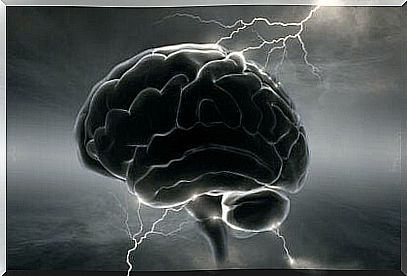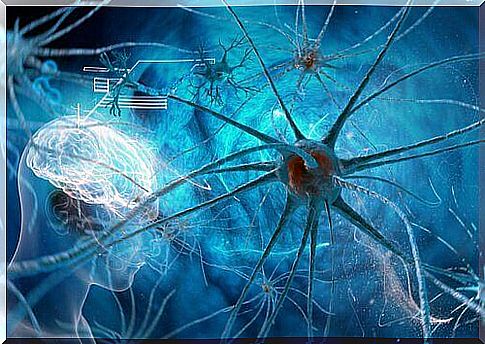Neurobiology Of The Psychopath: When The Brain Loses Its “humanity “

The neurobiology of the psychopath tells us that the brain of these people works differently. Beyond even their lack of empathy, other unique factors underlie that would leave a characteristic brain imprint on that 1% of the population that, according to experts tell us, could present clearly significant psychopathic traits.
It is possible that when we hear the word psychopathy, names like Charles Manson or Ted Bundy come to mind almost immediately. This psychological profile often becomes an object of fascination for many people, and that is why movies and television series that revolve around these types of characters tend to arouse so much interest. Evil, that is, the dark reverse of our ideal of humanity, intrigues us as much as it terrifies us.
This profile also shapes a certain number of people with whom we can interact on a daily basis. Moreover, as Jon Ronson himself explains, we live in a society that (in certain cases) is oriented and structured to reward this type of behavior. That is, that of those who manipulate, cheat and come to power violating the needs and rights of others.
Now, this implicit or explicit need for domination and aggression does not appear by chance. There are some biological bases behind that we must know.

Neurobiology of the psychopath
Before delving into the neurobiology of behavior, it is important that we first define what a person with this personality disorder is like and how it acts. Thus, broadly speaking, we could do it in the following way: a psychopath is someone who cannot or does not know how to love (does not have that capacity). He is someone who does not empathize, who is skilled at manipulation and an excellent strategist of lies.
They also know the skills of persuasion, they tend to have a very characteristic charm and they respond in a very concrete way in situations of anguish or stress: coldly. Today, we have, for example, a very valid instrument to measure this dimension: the Psychopathy test according to the Hare Scale. This tool allows us to assess the degree of psychopathy in each person, with 40 being the highest score.
The neurobiologist with the psychopathy gene
This data is interesting. Whenever a reference is made to the study of the neurobiology of the psychopath, it is almost obligatory to speak of a researcher. James Fallon, a neuroscientist at the University of California at Irvine, is one of the leading experts on the psychopathic personality. In fact, he is an adviser to the Pentagon and a reference in the study of the criminal mind.
The funny thing is that Dr. Fallon has in his brain “the gene for psychopathy. ” He and his team spent several years conducting different diagnostic tests on a large number of inmates, trying to find those brain markers that are behind these types of disorders. At one point, the results were as disturbing as they were revealing: Dr. James Fallon’s brain did not differ greatly from inmates diagnosed with a psychopathic personality disorder.
In reality, that data was not accidental. In Dr. Fallon’s family tree we can identify up to 7 murderers. For example, among them we find Lizzie Borden, a woman known as the ax killer who killed and dismembered her parents . Thus, this famous neuroscientist and absolute reference in the field of psychopathy personifies an idea. The neurobiology of the psychopath tells us that the evil gene exists, but certain triggers must be given for it to end up manifesting itself.
Let’s see below a series of data that will undoubtedly allow us to understand this idea.

A brain with less gray matter
In an interesting study carried out in 2012 at Kinng’s College in London, something was proven that Dr. Fallon himself had already observed in 2006 in his research with inmates. Namely, people diagnosed with psychopathy have less gray matter thickness in the anterior rostral prefrontal cortex and temporal poles.
What does this mean? This anomaly, which is undoubtedly the most characteristic of the psychopath’s neurobiology, reveals his lack of empathy and the difficulty in assuming something as important as the feeling of guilt.
Enjoy the pain of others, but not your own
We have pointed out throughout the article that the psychopathic personality is characterized above all by one factor: the lack of empathy. Now, within the neurobiology of the psychopath there is a small nuance: people with this profile do have empathy, but only about their own person. This is something that experts could see in a study from the University of Cambridge and published in Frontiers in Human Neuroscience in 2013.
For this work, 121 MRI scans were performed on inmates diagnosed with this personality disorder. When they were shown pictures showing different people experiencing pain, their brains did not react. They only did so when the experimenter asked them to imagine themselves in the same situation.
Now, the most striking came later. The researchers found that when these people saw others suffer and experience pain, a high activity arose in the striatum. This is a very interesting part of the human brain, because it is related to reward processing, motivation, pleasure, and decision making.
Thus, this unusual activity in this area came to demonstrate something very forceful: psychopaths enjoy seeing the pain of others.
Is there a gene for evil?
More than a gene for “evil”, what exists are genetic variants that define the greater tendency to violence, such as the CDH13 and MAOA genes. Neuroscientists from the Karolinska Institute revealed that we can all inherit these types of variants from our parents (if it is the case); however, not everyone gets to manifest them.
- Thus, and taking as a reference to the neuroscientist James Fallon, he himself had this marker in addition to the other brain alterations detailed above. However, beyond certain risk behaviors and certain impulse control problems, Dr. Fallon has never shown more psychopathic traits. Perhaps this has been the case for one factor: upbringing and education.
- He always had a loving family and an environment that knew how to direct him correctly. He never lacked affection, clear guidelines for behavior and an empathic setting where he never experienced any lack or trauma.

The neurobiology of the psychopath tells us that this condition often arises as a specific developmental disorder. Sometimes, a lack of attachment, a trauma in that early childhood or any situation of stress and anguish in the child generates a series of biochemical alterations that determine a progressive change in the brain and in behavior.
The environment, upbringing and education is everything. Genetics affect us, there is no doubt, but it does not determine us 100%. Likewise, it is worth noting something that anthropologists and psychologists tell us: violence and psychopathic behavior is decreasing.
Three centuries ago, violent and aggressive behavior defined much of our society. To this day, this behavior is in decline, although it refuses to disappear : 1% of our population continues to present this trait, that of psychopathy.









